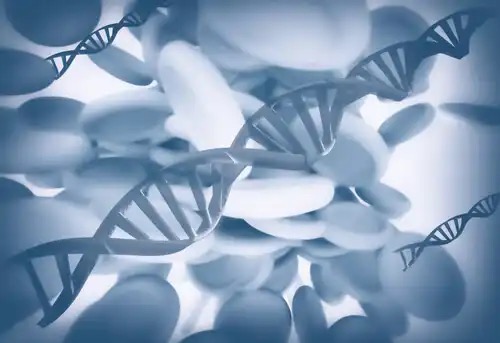The Influence of Epigenetics on Obesity

Epigenetics refers to genes that can be changed. In this article, we’ll explain how epigenetics influences obesity. Furthermore, how you can alter your epigenetics to improve your overall health.
Obesity is a chronic condition. It’s characterized by excess body fat. Its origins are multifactorial, including heredity, behavior, and environment. Obese people are at risk of developing many diseases. In fact, obesity is the second most important predictor of cancer, preceded only by tobacco use.
Epigenetics
Epigenetic refers to those elements of the genetic code that you’re able to change without altering your DNA sequence. In fact, it’s the area of genetics you’re able to change naturally. It includes which genes you express, to what degree, and at what time. Consequently, epigenetic processes determine whether a specific gene is active or not at any given time.
We call the expressed or “visible” set of genes the epigenome. The epigenome develops when you’re in the uterus. These genes can be transmitted from generation to generation. Unlike the genome (the complete set of genes in a cell), the epigenome is reversible.
Each organism has an epigenetic signature. This is partially inherited and partially generated during its life inside the uterus. However, it can change in adulthood due to the influence of the environment.
Epigenetic marks can be modified throughout life. However, modifications at critical periods of prenatal development, such as embryogenesis, have a greater effect on the phenotype.

Factors that influence epigenetics
In the absence of further studies, it seems that the main factors that influence epigenetics are:
- Diet.
- Physical activity.
- Sleep.
- Stress.
- Inflammation.
- Chemical products.
- UV rays.
- Environmental pollution.
The epigenetics of obesity
Current scientific knowledge suggests that genetics and behavior explain some cases of obesity, while others are due to epigenetic processes. Furthermore, scientists link excess body fat with the fact that certain genes are “marked”.
Epigenetics plays an extremely important role in all our lives. For example, say you were genetically predisposed to develop a specific disease. If you managed to positively influence your epigenome, you could avoid or reduce the effects of this disease. Similarly, if you negatively influenced your epigenome, you’d trigger or aggravate the disease.
Genetics are static and establish your predisposition to certain illnesses. Epigenetics is dynamic and determines whether the illness ultimately develops or not.
Another study analyzed 1100 mother-child couples. It attributed the risk of obesity in these participants to:
- Smoking before childbirth.
- Excessive weight gain during pregnancy.
- Breastfeeding for less than 12 months.
- Their baby sleeping for only short periods of time.
The study found that the risk of childhood obesity increased progressively as different circumstances were added.
Similarly, a study conducted in the Netherlands during the famine period of 1944-1945 demonstrated how epigenetics affects obesity. In fact, fetuses of mothers exposed to extreme hunger experienced more glucose intolerance, dyslipidemia, early coronary heart disease, and obesity. Therefore, starving could cause some of the diseases that are prevalent in society today.
How to generate healthy epigenetics
Your epigenetics develop in the uterus and continues to change throughout your life. It’s important for expectant parents to do the following to positively influence epigenetic markers:
- Lead a healthy lifestyle prior to embryogenesis.
- The mother to maintain healthy lifestyle habits throughout pregnancy.
- After birth, both the baby and its parents should maintain good lifestyle habits.
This way, both the incidence and prevalence of obesity and other diseases can be reduced.
The epigenome is determined by lifestyle habits and environmental factors. Therefore, people can change them.
The importance of diet
Diet is one of the most important factors that affect epigenetics. For this reason, you should follow an adequate and well-balanced diet. As well as being nutritionally beneficial, this positively affects the epigenome.
You should include fresh fruit and vegetables, legumes, fish, whole milk products, eggs, lean meat, nuts, seeds, healthy oils, and whole grains in your diet. This way, you get adequate amounts of folic acid, betaine, choline, and vitamin B12. These micronutrients positively impact the epigenome. They do this by deactivating harmful genetic areas.
You should avoid eating processed foods, those with added sugars, and trans fats. Experts link the consumption of these products with the activation of genes that are harmful to health.
On the other hand, low-protein or low-calorie diets negatively impact the epigenome. This is because they have a reduced ability to “silence” harmful genes.
The Mediterranean diet could have a positive impact on epigenetics. Furthermore, research suggests that following the Mediterranean diet during pregnancy reduces fetal epigenetic markers associated with metabolic syndrome.

The impact of physical exercise on epigenetics
Physical exercise, along with diet, can greatly influence the epigenome. Current research states that regular physical exercise by parents positively influences fetal metabolic health. In addition, regular exercise in adulthood positively impacts epigenetics.
Physical exercise contributes to the management of obesity. This isn’t just due to its impact on the energy balance, as it also influences the epigenome.
Final conclusions
As we mentioned above, it seems that the benefits you achieve by maintaining an adequate balanced diet, having an active life, restful sleep, maintaining gut microbiota balance, reducing contact with chemicals, and avoiding UV rays and environmental pollution are due, partly, to their positive impact on the epigenome.
A proper lifestyle “turns on” protective genes and “turns off” disease-producing genes. Therefore, the benefits of a healthy lifestyle, particularly when it comes to obesity and other chronic diseases are due, in part, to their positive impact on the epigenome.
All cited sources were thoroughly reviewed by our team to ensure their quality, reliability, currency, and validity. The bibliography of this article was considered reliable and of academic or scientific accuracy.
Campión Zabalza, J., Cordero, P., Martínez, J.A. & Milagro Yoldi, F.I. (2010). Epigenética nutricional: una pieza clave en el rompecabezas de la obesidad. Rev Esp Obes, 8(1): 10-20. Consultado el 24/07/2019. Recuperado de https://dadun.unav.edu/handle/10171/28084
Casanello, P., Castro Rodríguez, J.A., Krause, B.J. & Uauy, R. (2016). Epigenética y obesidad. Revista Chilena de Pediatría, 87(5): 335-342. Consultado el 24/07/2019. Recuperado de: https://www.sciencedirect.com/science/article/pii/S037041061630122X
Coltell, O., Cordella, D., Ordovás, J.M. (2016). Genetics and Epigenetics of obesity. Anales de la Real Academia Nacional de Farmacia, 82: 129-136. Consultado el 24/07/2019. Recuperado de: http://www.analesranf.com/index.php/aranf/article/view/1751/1741
Cordero, P. (2014). Obesidad, nutrición perinatal y epigenética. Revista Matronas, 1(2): 41-49. Consultado el 24/07/2019. Recuperado de: https://www.enfermeria21.com/revistas/matronas/articulo/30/obesidad-nutricion-perinatal-y-epigenetica/
Hargreaves, M. & McGee, S.L. (2019). Epigenetics and exercise. Trends Endocrinol Metab. Consultado el 24/07/2019. Recuperado de: https://doi.org/10.1016/j.tem.2019.06.002
Lorite Mingot, D. (2017). Efectos epigenéticos de la dieta mediterránea sobre marcadores de síndrome metabólico durante el embarazo (Trabajo Fin de Grado), Universidad Complutense de Madrid, Madrid.
Mardani, M., Rezapour, S. & Shiravand, M. (2018). Cambios epigenéticos debidos a la actividad física. Biotechnol Appl Biochem, 65(6): 761-767. Consultado del 24/07/2019. Recuperado de: https://www.ncbi.nlm.nih.gov/pubmed/30144174
This text is provided for informational purposes only and does not replace consultation with a professional. If in doubt, consult your specialist.








